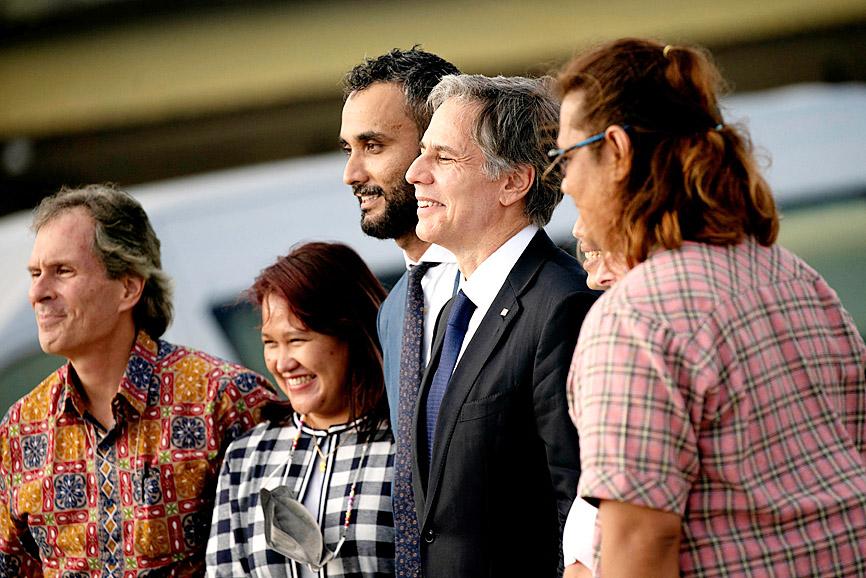US Secretary of State Antony Blinken yesterday blasted Beijing over its support of Russia after emerging from more than five hours of talks with Chinese Minister of Foreign Affairs Wang Yi (王毅).
During a meeting on the sidelines of a G20 meeting in Indonesia, Blinken said he told Wang that China was not neutral on Russia’s war in Ukraine because there is no such thing as being neutral when there is a clear aggressor.
He cited Chinese President Xi Jinping’s (習近平) June 15 telephone call with Russian President Vladimir Putin as evidence of Beijing’s ongoing support.

Photo: REUTERS
Blinken said that G20 countries had urged Russian Minister of Foreign Affairs Sergey Lavrov to lift a blockade on grain from Ukraine to ease food shortages around the world.
Blinken said he also conveyed to Wang that now was the time for China to call on Russia to end its blockade of Ukrainian ports and allow ships to export grain.
“Now what you hear from Beijing is that it claims to be neutral,” Blinken said. “I would start with the proposition that it’s pretty hard to be neutral when it comes to this aggression. There’s a clear aggressor. There’s a clear victim.”
China’s support for Russia was evident at the UN and in Chinese state media’s amplification of Russian propaganda, he said.
Blinken said he and Wang “addressed areas of disagreement, and ways to manage and reduce risks” while bringing up contentious issues such as tensions in the Taiwan Strait, Hong Kong’s democracy and allegations of forced labor in Xinjiang.
Blinken also pushed back against the idea that Wang’s two-week trip through the region suggested that China was more committed to engagement with Southeast Asia.
“What we’re about is not asking countries to choose, but giving them a choice when it comes to things like investment in infrastructure,” he said, adding that the US wanted to engage in a “race to the top,” not the bottom.

CHAOS: Iranians took to the streets playing celebratory music after reports of Khamenei’s death on Saturday, while mourners also gathered in Tehran yesterday Iranian Supreme Leader Ayatollah Ali Khamenei was killed in a major attack on Iran launched by Israel and the US, throwing the future of the Islamic republic into doubt and raising the risk of regional instability. Iranian state television and the state-run IRNA news agency announced the 86-year-old’s death early yesterday. US President Donald Trump said it gave Iranians their “greatest chance” to “take back” their country. The announcements came after a joint US and Israeli aerial bombardment that targeted Iranian military and governmental sites. Trump said the “heavy and pinpoint bombing” would continue through the week or as long

TRUST: The KMT said it respected the US’ timing and considerations, and hoped it would continue to honor its commitments to helping Taiwan bolster its defenses and deterrence US President Donald Trump is delaying a multibillion-dollar arms sale to Taiwan to ensure his visit to Beijing is successful, a New York Times report said. The weapons sales package has stalled in the US Department of State, the report said, citing US officials it did not identify. The White House has told agencies not to push forward ahead of Trump’s meeting with Chinese President Xi Jinping (習近平), it said. The two last month held a phone call to discuss trade and geopolitical flashpoints ahead of the summit. Xi raised the Taiwan issue and urged the US to handle arms sales to

BIG SPENDERS: Foreign investors bought the most Taiwan equities since 2005, signaling confidence that an AI boom would continue to benefit chipmakers Taiwan Semiconductor Manufacturing Co’s (TSMC, 台積電) market capitalization swelled to US$2 trillion for the first time following a 4.25 percent rally in its American depositary receipts (ADR) overnight, putting the world’s biggest contract chipmaker sixth on the list of the world’s biggest companies by market capitalization, just behind Amazon.com Inc. The site CompaniesMarketcap.com ranked TSMC ahead of Saudi Aramco and Meta Platforms Inc. The Taiwanese company’s ADRs on Tuesday surged to US$385.75 on the New York Stock Exchange, as strong demand for artificial intelligence (AI) applications led to chip supply constraints and boost revenue growth to record-breaking levels. Each TSMC ADR represents

Pro-democracy media tycoon Jimmy Lai’s (黎智英) fraud conviction and prison sentence were yesterday overturned by a Hong Kong court, in a surprise legal decision that comes soon after Lai was jailed for 20 years on a separate national security charge. Judges Jeremy Poon (潘兆初), Anthea Pang (彭寶琴) and Derek Pang (彭偉昌) said in the judgement that they allowed the appeal from Lai, and another defendant in the case, to proceed, as a lower court judge had “erred.” “The Court of Appeal gave them leave to appeal against their conviction, allowed their appeals, quashed the convictions and set aside the sentences,” the judges